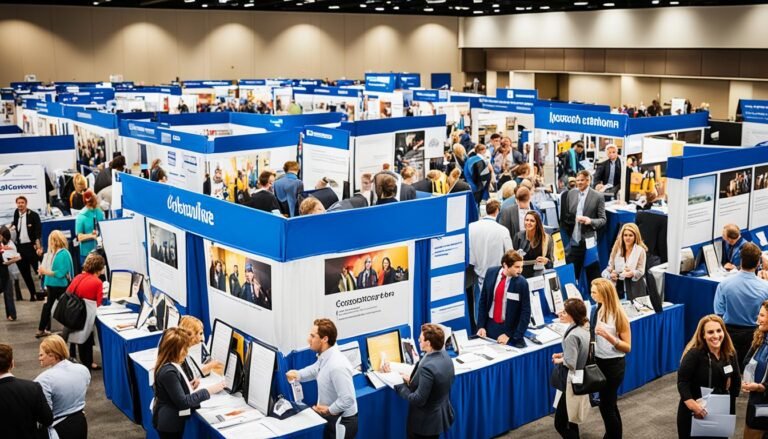The Ultimate Job Fair Prep Guide for Job Seekers
Did you know that over 200 organizations and approximately 1,400 job seekers participate in traditional career fairs, highlighting the competitive landscape job seekers face today12? These events serve as a pivotal platform for connecting with local employers, offering a chance for well-prepared candidates to demonstrate their skills and secure interviews effectively1. This guide aims to provide you with vital job fair tips and strategies, ensuring you’re adequately prepared for success.
Grasping the essence of job fairs, the significance of a customized resume, and the art of networking is crucial. Through diligent preparation, you can substantially boost your chances of leaving a memorable impression on potential employers, thereby improving your job search outcomes. Let’s talk about the ultimate job fair prep guide for job seekers.

Understanding Job Fairs and Their Purpose
Job fairs act as pivotal events, connecting employers with individuals in pursuit of career opportunities. These cross-sector gatherings facilitate dialogue between employers and job seekers, enabling discussions on potential employment and career paths. Participants benefit from the opportunity to pose questions, acquire crucial information, and fortify their professional networks.
Understanding what is a job fair encompasses a spectrum of formats, from traditional in-person events to contemporary virtual fairs. Virtual fairs can span from a single day to several days, contingent on the organization’s size and the number of vacancies3. These events transcend geographical boundaries, offering a global talent pool that traditional fairs might not reach due to budget constraints3.
For job seekers, these fairs present a plethora of opportunities. Attendees can delve into company cultures, forge professional connections, and peruse current job openings. The ability to find job listings in one location simplifies the search for suitable positions3. Moreover, employers leverage these events to showcase their organizations as attractive workplaces.
Grasping the core purpose of attending job fairs is essential. While the immediate aim of securing employment is prevalent, the true value lies in cultivating relationships and gaining insights into hiring organizations. It is imperative for job seekers to approach these events with an open mindset, prepared to uncover the extensive career opportunities available4.
Why Preparation is Key for Job Fair Success
Preparation is crucial for job fair success, showcasing your dedication to career fair readiness. Without thorough planning, attending a job fair can result in missed networking opportunities and reduced interaction with employers. These events, often held in large venues, span from a single day to several, attracting companies with diverse hiring needs5.
Effective preparation tips for job fairs involve researching attending companies, updating your resume, and rehearsing your elevator pitch. An updated LinkedIn profile and printed resumes are essential6. Logistics are also critical; plan your transportation, choose appropriate attire, pre-register if possible, and gather company information and a venue map6. Aim to bring 20 to 25 tailored resumes, each one page long, with bulleted statements that emphasize your relevant skills and achievements6.
Virtual career fairs offer distinct benefits, such as eliminating the need for travel, making them accessible to a wider audience, including those in rural areas and military spouses5. They also provide a more comfortable environment, particularly for introverts5. Preparing well enhances your chances of engaging effectively at fair booths, where a firm handshake, eye contact, and a positive demeanor are crucial6. This proactive approach is vital for standing out among numerous candidates.
Researching Companies Attending the Job Fair
Investing time in researching companies at a job fair is crucial for job seekers aiming to improve their networking. By researching companies, candidates can tailor their conversations and show genuine interest in potential employers. This knowledge allows individuals to discuss how their skills and experiences align with the company’s needs with confidence.
Identify Companies Aligned with Your Career Goals
Understanding which companies align with your career goals can significantly impact your job fair experience. Begin by examining the list of participating companies and identify those that reflect your professional aspirations. Each job seeker should prioritize these companies to develop focused strategies for engagement during the event. Customizing your approach can make a lasting impression and facilitate relatable discussions.
Understand Company Missions and Current Job Openings
Knowledge about a company’s mission and values fosters more meaningful dialogue. Seek out information on current job openings that match your qualifications, as this demonstrates a well-rounded understanding of the organization. Job seekers should review available roles to match their skills with the expectations of potential employers. This groundwork prepares candidates for confident interaction and effectively addresses the needs of recruiters.
| Company | Mission Statement | Current Job Openings |
|---|---|---|
| Company A | Innovation for a sustainable future. | Software Engineer, Marketing Coordinator |
| Company B | Connecting communities through technology. | Data Analyst, Customer Service Representative |
| Company C | Empowering health and wellness. | Project Manager, Sales Associate |
In summary, job seekers who dedicate time to researching companies prior to the fair enhance their ability to engage effectively with potential employers. Understanding company missions and current job openings establishes a connection that promotes successful networking at the event. This preparation process assists in aligning career goals with prospective opportunities, making for a more successful job fair experience789.
The Ultimate Job Fair Prep Guide for Job Seekers
Mastering the art of job fair preparation necessitates a strategic framework that amalgamates various pivotal elements crucial for efficacious job hunting strategies. Direct interaction with prospective employers at job fairs enables candidates to delve into potential job opportunities while exhibiting their competencies. An astonishing 78% of hiring managers posit that dressing appropriately for the industry you are targeting significantly boosts your chances of success at a job fair10. It is imperative to adopt methodologies that distinguish you from other aspirants when preparing for these pivotal events.
One crucial element of job fair resources is the importance of dressing professionally. Indeed, 65% of recruiters deem personal appearance to have a profound influence on a candidate’s initial impression11. A well-groomed appearance communicates a sense of professionalism and commitment to potential employers. Furthermore, it is advisable to bring multiple copies of your resume, as 91% of hiring managers value the preparedness of candidates who possess extra resumes11.
Integrating these effective job searching strategies will enhance your potential for securing interviews. Preparations should extend beyond your resume and attire to include rehearsing your elevator pitch for clear and assertive communication. By synthesizing these components, you forge a comprehensive strategy that amplifies your job fair impact and employment prospects.
Updating Your Resume for the Job Fair
To excel at a job fair, it’s imperative to dedicate time to refining your resume. A resume meticulously tailored for specific positions can dramatically boost your likelihood of leaving a memorable impact. Adhering to fundamental resume tips is crucial to highlight your skills and experiences effectively.
Tips for Tailoring Your Resume for Specific Roles
Customizing your resume entails adjusting the content to match the job descriptions of the roles you aim for. Key strategies include:
- Highlight relevant skills: Ensure you underscore the skills explicitly mentioned in the job ad.
- Use impactful language: Choose action verbs and quantifiable outcomes to detail your roles.
- Keep it concise: Concentrate on the most critical details, aiming for a single page if feasible.
- Format professionally: Ensure your resume’s layout is clean to improve readability.
Delving into the companies you’re keen on can significantly enhance your resume’s customization. It enables you to match your experiences with their anticipated requirements12.
Printing Multiple Copies for Distribution
At a job fair, the significance of job fair resume printing is paramount. Be prepared to carry at least 15 copies of your resume to interact with numerous employers efficiently13. This abundance showcases your readiness and professionalism. It facilitates easy distribution of your resume to various recruiters, thereby enhancing your networking potential. Adhering to these strategies equips you to navigate the job fair with confidence and effectiveness.
Dressing Professionally for First Impressions
Attending job fairs requires a strategic approach to attire, significantly influencing the initial perception by potential employers. It is crucial to select attire that embodies both professionalism and personal style. Classic hues such as black, navy, and gray are favored for their ability to project a polished image14. Traditional business attire, including suits or blazers, stands as a dependable choice for job fairs14.
When selecting attire for interviews with smaller entities or nonprofits, opting for solid colors or subtle patterns is advisable. For tops, tailored blouses and crisp dress shirts are recommended for their ability to maintain a sharp look14. Accessories, such as a quality leather belt and understated jewelry, are crucial in enhancing one’s overall appearance14. Conversely, attire that leans towards casual, like sweatpants or graphic tees, should be avoided, as first impressions are pivotal in these contexts.
Steering clear of revealing attire, such as low-cut tops or shorts above the knee, is essential to uphold a professional image14. Instead, focus on garments like collared shirts, button-downs, and fitted sweaters that exude confidence and respect15. A meticulous selection of attire for job fairs not only signals a commitment to one’s career but also exhibits respect for the opportunity to engage with potential employers. Such attire choices can significantly influence the trajectory of career advancement by setting the stage for impactful interactions.
| Attire Type | Description |
|---|---|
| Professional Bottoms | Tailored slacks, pencil skirts, or dress trousers in neutral colors such as gray or navy. |
| Professional Tops | Tailored blouses, crisp dress shirts, and refined knit tops. |
| Accessories | Tasteful watches, understated jewelry, and quality leather belts. |
| Shoes | Dress shoes, loafers, or professional flats are ideal. |
| Overall Appearance | A polished look with clean hair, minimal makeup, and neutral fragrances helps convey professionalism. |
Preparing Your Elevator Pitch
Creating an effective elevator pitch is vital for establishing robust connections at job fairs. It should encapsulate your background, skills, and professional goals concisely. Given the pitch’s brevity, focusing on pivotal elements is crucial for an engaging introduction16.
Crafting a Concise 30-Second Introduction
Your pitch should highlight your academic focus, the skills you bring to the table, and any pertinent certifications. Adapting your pitch for various industries and roles is essential at job fairs. Rehearsing your pitch with a friend or family member can enhance your confidence and delivery16. Techniques to alleviate stress and anxiety are paramount, as public speaking is a significant phobia for many17. Deliver your pitch with assurance to make a memorable impact.
Practice: Delivering Your Pitch With Confidence
Rehearsal is key before the event. Aim for a seamless 30-second pitch to convey your message effectively16. Adequate sleep before attending can improve your performance and reduce nervousness17. Moreover, having business cards or resumes ready facilitates follow-ups and continued networking after your pitch.
Networking Tips for Job Fair Success
Effective networking at job fairs is pivotal for your job search. It’s estimated that 80 percent of jobs are secured through networking, underscoring the significance of forging connections in these environments18. To enhance your prospects, engage employers by posing thoughtful queries and actively listening to their replies. This approach is vital for effective communication at job fairs, showcasing your genuine interest in the companies represented18.
Engaging Employers: What to Ask and How to Listen
When conversing with representatives, inquire about the company culture, its latest projects, or pathways for career progression. Being adept at discussing your skills and past experiences fosters meaningful dialogue. Moreover, effective communication at job fairs entails maintaining eye contact and demonstrating the value you place on their insights. Such interactions lead to robust relationship building, as those who exude confidence and a keen curiosity are more apt to be recalled18.
Exchanging Business Cards and Building Connections
It is crucial to bring at least 20 copies of your resume to job fairs19. Additionally, prepare bespoke business cards that feature your contact details and LinkedIn profile. The act of exchanging business cards facilitates streamlined communication post-event and cements your presence in recruiters’ minds. Subsequent to the event, a prompt follow-up via tailored emails or LinkedIn requests is essential for nurturing the professional network you’ve started to cultivate1819. Expressing gratitude to those who discussed job prospects further amplifies your professionalism and signals your sustained interest in these valuable connections18.

| Action Item | Details |
|---|---|
| Prepare Questions | Ask about company culture and job opportunities. |
| Business Cards | Bring personalized cards for easy contact exchange. |
| Follow-Up | Send emails or connection requests within 24-48 hours. |
| Thank-You Notes | Express gratitude to recruiters who engaged with you. |
Making the Most of Your Time at the Job Fair
Job fairs are a treasure trove for job seekers, demanding strategic time management for success. Prioritize employers based on your research and career objectives. Interestingly, 60% of job seekers look for new opportunities online, while 40% prefer in-person networking at job fairs20. This underscores the significance of allocating time to connect with companies that resonate with your career goals.
Engagement is paramount; invest in meaningful dialogues with recruiters and hiring managers. These professionals often represent firms actively seeking candidates at job fairs within a condensed timeframe. Employers evaluate resumes and assess their recruitment investment, making your interaction crucial for both parties20.
Strategic booth visits can be enhanced by creating a checklist of company priorities. Being selective about which booths to visit first ensures a focused approach. Research indicates that recruiters typically pose around 10 tailored questions at job fairs21. Preparing for these questions showcases your qualifications and interests effectively.
A structured visit approach can significantly influence your experience, ensuring optimal time utilization. Approximately 25% of companies advertise their job fair participation through social media, highlighting the value of online research before attending21. Allocating time to learn about these companies’ values facilitates more personalized interactions.
In conclusion, the essence of a successful job fair experience hinges on effective time management. Engage actively, prioritize wisely, and prepare thoroughly to forge valuable connections and seize opportunities.
Following Up After the Job Fair
Following up after a job fair is crucial for reinforcing the connections made during the event. It’s a chance to express gratitude and reiterate interest in potential job opportunities. Crafting personalized thank-you emails can significantly enhance your chances of standing out among other candidates.
Writing Personalized Thank-You Emails
Sending thank-you emails within 24 to 48 hours is highly recommended. It shows proactive engagement and appreciation for the time employers spent with you at the fair22. Personalization is key; referencing specific conversations or points discussed can make your message memorable. It is beneficial to incorporate your interest in their organization and any steps you plan to take moving forward. This practice not only strengthens your candidacy but lays the groundwork for maintaining professional connections.
Demonstrating Professionalism and Interest
Maintaining professionalism in your follow-up communications is vital. Following up every one or two weeks can keep you on the radar without overwhelming hiring managers23. This approach balances persistence and respect, encouraging a productive dialogue. Networking on platforms like LinkedIn can be effective; connecting with recruiters and professionals you met can facilitate ongoing discussions24. Remember to inquire about referrals as a way to increase your chances of securing interviews, further emphasizing your dedication to exploring opportunities. Following these strategies will undoubtedly contribute to successful job fair follow-up activities and lasting professional relationships.
Common Job Fair Mistakes to Avoid
Understanding job fair mistakes can significantly improve your experience and outcomes. Many job seekers overlook the importance of researching the companies participating, leading to pitfalls to avoid during interactions. By familiarizing oneself with a company’s values and job openings, candidates can engage more meaningfully, leaving a lasting impression on recruiters. This expectation of knowledge underscores the critical role of preparation in laying a positive foundation for successful engagement at job fairs2526.
Arriving prepared and organized is a key strategy for enhancing your experience. Neglecting this aspect can result in poor time management; by prioritizing companies based on thorough research, you can optimize your time at the fair25. Moreover, not rehearsing your elevator pitch is another common error. A well-crafted introduction can significantly influence interactions, showcasing genuine interest in the roles discussed2527.
Another prevalent mistake is underestimating the importance of appropriate attire. Dressing professionally is crucial for making a favorable impression and reflects your commitment to potential opportunities2627. Effective networking is essential; some candidates engage in casual conversations rather than establishing meaningful connections with employers. Balancing professionalism with approachability is key to leaving a positive impression that could lead to future opportunities2627.
Post-event, forgetting to follow up is a critical error that can impede potential job offers. Following up communicates continued interest and can transform connections into actual job opportunities2526. For further insights on navigating these aspects effectively, consider exploring resources that detail other job fair experiences here.
Utilizing Online Job Fair Platforms
The emergence of online job fairs has revolutionized the job search process, becoming a crucial tool for candidates in the competitive job market. These virtual events offer substantial benefits, including a global reach that connects participants with employers worldwide, thereby broadening their job prospects beyond local confines28. Recent statistics reveal that 73% of recent college graduates are still on the hunt for full-time employment, underscoring the need for alternative job search strategies. Moreover, 80% of employers anticipate the recruitment process to remain predominantly virtual, highlighting the importance of adapting to this new norm2928.
Online job fairs not only offer convenience, allowing participants to access the event from anywhere with an internet connection, but also help in reducing the travel costs typically associated with traditional job fairs28. These platforms are equipped with smart scheduling tools, which streamline interactions, enabling candidates to make the most of their time during the event. A notable example is a virtual career fair for nurses, which attracted over 300 attendees and resulted in 35 job offers, showcasing the efficacy of such online gatherings29.
To successfully navigate these virtual events, job seekers must prepare thoroughly. This includes creating detailed profiles, actively engaging with recruiters, and following up after the event to leverage their connections28. Presenting a company’s culture and engaging candidates through content like videos can also significantly enhance success in these online platforms. By employing these tactics, candidates can greatly increase their likelihood of securing the ideal job in this evolving market29.
Source Links
- https://starlingcs.ca/blog/2024/mastering-the-job-fair-a-job-seekers-guide-to-success – Mastering the Job Fair: A Job Seekers Guide to Success – Lutherwood
- https://www.rakuna.co/blog/job-fair-recruitment-guide/ – Job Fair: The Ultimate Guideline For Employers
- https://www.vfairs.com/guides/what-are-virtual-job-fairs/ – Virtual Job Fairs: The Definitive Guide (2024) – vFairs.com
- https://career.fsu.edu/sites/g/files/imported/storage/original/application/1ad1d4dc79aa076c74409d97c046deaf.pdf – PDF
- https://topresume.com/career-advice/job-fair – How to Prepare for a Career or Job Fair
- https://www.linkedin.com/pulse/prepare-now-stem-career-fair-success-ie-interview-don-gallagher – Prepare NOW for Career Fair Success (i.e., Interview Callbacks)
- https://www.goodwilltalentbridge.com/blog/thrive-at-job-fairs-essential-preparation-tips-for-success – Maximize Your Job Fair Success: Comprehensive Preparation Tips & Strategies
- https://www.linkedin.com/pulse/top-6-tips-successful-job-fair-employers-hoyin-cheung – The Top 6 Tips for a Successful Job Fair for Employers
- https://pdf.usaid.gov/pdf_docs/PNADQ008.pdf – PDF
- https://www.pinnaclepromotions.com/blog/an-employers-guide-to-job-fair-recruitment-strategy/ – An Employers Guide to Job Fair Recruitment Strategy – Pinnacle Promotions Blog
- https://www.employmentconnect.org/job-seeker-resources/dress-for-success – Job Fair Preparation Tips: Dressing For Success
- https://www.resumecoach.com/job-fair-guide/ – The Ultimate Job Fair Guide: 10 Tips to Land an Interview
- https://students.brooklyn.edu/knowledge-base/how-do-i-prepare-for-a-job-fair/ – What do I do before, during and after a job fair? – BC Knowledge for Students
- https://www.linkedin.com/pulse/ultimate-guide-what-wear-job-fair-prodivnet-lbohc – The Ultimate Guide to What to Wear to a Job Fair
- https://www.extern.com/post/preparing-for-career-fair-success-research-what-to-ask-and-dress-code – Career Fair Success: Questions to Ask and What to Wear
- https://joinhandshake.com/blog/students/college-student-elevator-pitch/ – How to Prepare Your Virtual Career Fair “Elevator Pitch”
- https://www.northcentralcollege.edu/news/2020/10/26/perfect-elevator-pitch-career-fair – North Central College
- https://www.ellevatenetwork.com/articles/7179-networking-tips-to-make-it-a-career-fair-to-remember – Networking Tips to Make it a Career Fair To Remember
- https://careerservices.cns.utexas.edu/resources/career-fair-guide/preparing-career-fairs – Preparing for Career Fairs
- https://joinhomebase.com/blog/job-fairs-for-employers/ – Job fairs for employers: How to recruit your next superstar | Homebase
- https://resources.workable.com/tutorial/job-fair-recruitment – Job fair recruitment: A planning guide for employers
- https://starlingcs.ca/blog/2024/the-right-way-to-follow-up-after-a-job-fair – The Right Way to Follow Up After a Job Fair – Lutherwood
- https://www.linkedin.com/advice/3/how-can-you-effectively-follow-up-after-job-fair – How can you effectively follow up after a job fair?
- https://medium.com/@leegamelin/mastering-the-art-of-job-fair-navigation-your-guide-to-making-lasting-impressions-950f1da46a9e – Mastering the Art of Job Fair Navigation: Your Guide to Making Lasting Impressions
- https://www.vfairs.com/blog/job-fair-tips/ – Job Fair Tips: 7 Ways to Set Yourself Apart In-Person – vFairs.com
- https://oilmanmagazine.com/making-an-impression-ace-your-next-job-fair-with-these-oil-and-gas-strategies/ – Making an Impression: Ace Your Next Job Fair with These Oil and Gas Strategies – OILMAN Magazine
- https://upstaff.ca/how-to-prepare-for-a-job-fair/ – Tips on How to Prepare for a Job Fair – Upstaff Canada
- https://weandgoliath.com/virtual-job-fair-examples/ – Virtual Job Fair Examples and Tips
- https://www.cnbc.com/2020/08/01/virtual-career-fairs-how-to-land-a-job-offer-at-an-online-event.html – How to prepare for — and land a job — at a virtual career fair







